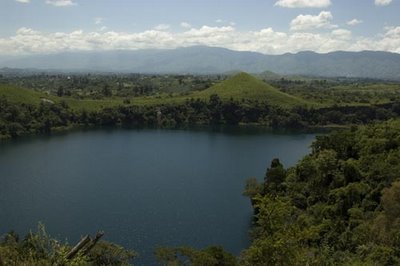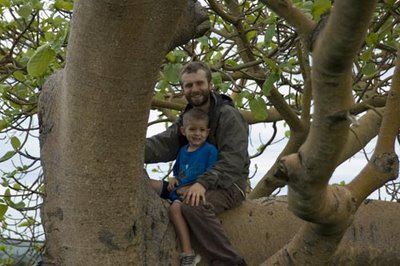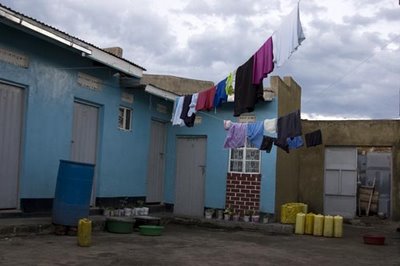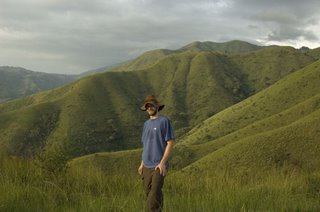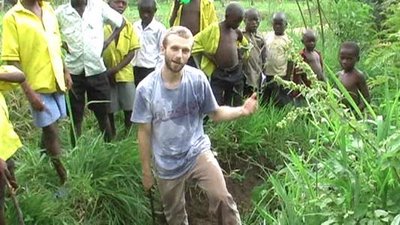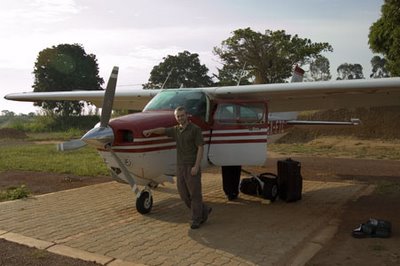
Hello to all of my wonderful friends!!! I've just set up this blog so that I can post a lot of the day to day things here without bunching up your e-mail accounts. I'll also be able to include some pictures. I'm going to include my first two e-mails below so that everyone can be kept up to speed.
The pictures are: 1) the MAF plane that I flew to Bundibugyo, 2) some smiling goats for Kim Skinner, 3) a picture of the countryside in Nyahuka, Bundibugyo so that you could see some of the housing.

---E-mail #2---
The quick update:
Health: good today, however this week I have been battling a mysterious cold type sickness (it likes to jump days).
Beard Status: a few days short of actual “beard” status, but still a little more than just stubble.
Hair Status: Still short…my cowlick has been doing some serious bed-head action. (at least I saw this in a rear view mirror…and that brings up an interesting point. I think that in the week and a half that I have been here, I have seen a mirror maybe 2 or 3 times, it’s funny how you surprise yourself when you don’t look at a mirror every day).
Stamina: long week, I’m pretty worn out from being in a new culture and constantly learning.
Hello everyone,
I hope that this message finds each of you doing well. I hope that you have caught on by now that I will be providing a “quick update” at the beginning of each of my e-mails for those of you who prefer short headlines instead of lengthy e-mails. I’m sure that in the future I will need to add more categories, but I like the ones that are there now because I know that many of you (i.e. the “big skinny”) really are concerned about things like my beard.
Since it has been about a week, there are so many things to write about and say. I will do my best to recount many of them, but I also want to challenge each of you to think about some of the issues and cultural questions that I have been asking myself so that hopefully you will be able to identify more with where I am. I will start with what I have been up to this we
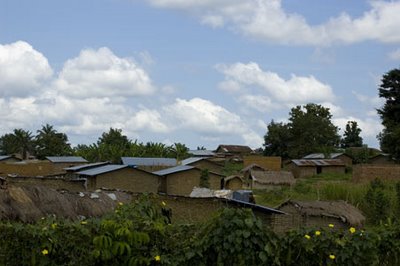
ek.
Last Saturday, Michael took me, and many of the missionaries and their kids to a place that is affectionately called Ngite (phonetically: en – gee – tay). Ngite is the name of a town, the name of a river, and the name of a waterfall that is all geographically located in approximately the same place. The specific place that we visited was the waterfall, which was about a 20 minute hike up the Rwenzori mountain range. I am not sure what Ngite means, but if I had to take a guess it would be: “African air conditioning”. It might also mean: “freezing cold water that you must get in or the other missionaries will think that you are a whimp.” Our trip to Ngite was more that just a sightseeing adventure into the mountains, Ngite is also the headwaters for the water project that serves the village of Nyahuka, the village in Bundibugyo that I am residing in. Michael showed me the water inlet for the existing pipeline and we talked about the design for the expansion that will feed the new pipeline that we are hoping to build to the town on the boarder of the Congo. It was a very productive trip in which I learned a lot about our projects and I also managed to discover the local Ugandan plant equivalent of stinging nettles. Let me tell you…fun times. But that was our trip to Ngite…I will have the pleasure of spending a lot of time there in the coming months when we are constructing the extension.
Another big event of the week was the Scott Myhre (the male team leader) and Michael (the water engineer) went to the southern Sudan to the Cush Conference, which was a conference for missions organizations to hear of the need in southern Sudan and to possibly be involved in doing mission work in the future. I have heard a little bit about the trip…but I have yet to get all of the details. In the wake of their absence the missions community here continued on. I think that this put additional stress on the team here especially for Jennifer and Karen who as the wives of those men (respectively) had much more on their plate regarding their missions work (Jennifer – medical work in the health clinic, Karen – food/nutrition program and the Matiti project which provides goats for goat milk for infants of HIV+ mothers) as well managing their families which God has blessed with many children. Please say a quick prayer for Jennifer as you read this, because Scott will still be traveling for another week.
While Michael was away, I worked with some of the local guys from the workshop who do a lot of work with Michael. There names are Bambo (ph: Bom – bo, not like the plant bamboo) and Kizza (ph: Key – za). They are Christian men who both know a little English and have some machining and plumbing skills. I learned some very important lessons this week. One lesson, was that, in Uganda, things take longer. Much longer. I think that there are a few reasons behind this, one being, that efficiency is not a high priority. Another is that many of the tasks that we were accomplishing we did not have tools that were the quickest or even designed to do what we were trying to do with them. We had to improvise. That being said, we were able to do some complex work with even rudimentary tools (i.e. my pocket knife cutting through a water cistern to install a float valve) and I was able to focus on relationships with those men. This culture is very much focused on relationship instead of productivity.
Another notable event was that Christ’s School (the missions boarding school for Ugandans) had its annual parents day. I was able to attend some of it and was able to see the choir perform and see some traditional Ugandan dancing. It was also good opportunity for the leadership of the school and the mission to address the local Ugandans and for the student to showcase their hard work.
And this brings us to today. Today was my first experience at the market. Wow. I’m pretty sure that almost the entire population of Nyahuka was at the market today. There were people selling clothes, fish, plastic bags to put your fish in, live chickens (that’s how you get them here, unless you get them in Kampala J). I already had most food that I would need for the coming weeks, but my particular item I was trying to procure from the market today was some fresh tilapia that had been driven in from Lake Albert this same day. The moment that we reached the market and that Kizza was pointing out things to me, the heavens opened up and let forth an afternoon rain shower that is so common in the rainy season. Kizza and I quickly ran to the shops of one of his relatives where we were able to stay inside until the rain stopped. This time afforded a neat opportunity to talk to Kizza and his relative (his relatives Christian name was Edward, I can’t remember his Lubwisi name). I was able to ask them a lot of questions about culture and their families and I was also able to share a little bit about why I was in Uganda as a missionary. It’s wonderful how God can use even a rain shower to give you the opportunity for you to give a testimony about what He is doing in your life.
The last event that I am going to write about is this evening. Tonight is the first night that I tried to cook my own meal. (dun dun dun… you can cut the suspense with a knife). I decided that I was going to cook vegetable quesadillas…which was something that I felt that I could accomplish without much fanfare. However, the mistake came when I tried to get all exotic and instead of boiling the rice in water, I decided to go all Asian and steam it. HAHAHA. 45 minutes later, I had lots of steam and rice that was still only half cooked. I’m not sure where I went wrong. It was probably in using a strainer to hold the rice. I ended up dumping it in the water and boiling the rest of the way. Meal saved. What I really wanted to talk about was that halfway through the preparation of my dinner, my neighbor, Bhiiwa (ph: be - i – wa) came to the door and I invited him in. He ended up staying for dinner (it is customary to invite someone in for food if they visit at dinner time) and we were able to discuss a lot of good topics. Bhiiwa is an evangelist for the UPC, Ugandan Presbyterian Church. He probably speaks the best English of all of the Ugandans that I have met and he has very good knowledge of the Gospel and the Scriptures. Here is an overview of the topics that we discussed:
How do the Ugandans think that the Mojungu (white foreigners), get their money? We are very often asked for money.
What do the Ugandans think of tithing?
Do Ugandans connect the dots with a holistic ministry in that the humanitarian side of the ministry is married to a redemptive Gospel?
How do Ugandan’s perceive the way that we live in relating to their culture? I was struggling with this because our houses are nicer, our clothes are nicer, we have solar power, we have computers, some of the missionaries have cars which are likely the only ones in town. We even hire Ugandans to work in our houses during the week to help with basic chores. In many ways it seems that we live like kings relative to the local population (for everyone who was wondering, “how are you going to wash your clothes in Uganda.” Here is the answer: I hire someone to do it for me. Now I am sure that many of your jaws may currently be on the floor…mine was when I first asked this question…it just somehow seemed wrong to me…socially unjust. However, it is a good paying job for a local Ugandan who otherwise would not have work and it allows me to work in ministry and on the water projects when because of the lack of modern conveniences I would spend all day just keeping house). Many of the missionaries who are here that I have talked to have struggled with these things at one time or another while they were here. Bhiiwa offered me much good advice and information on these questions.
Wow, I have written one long e-mail. I would like to end with some prayer requests. Please be in prayer for this culture and the area of Bundibugyo, it is one riddled by corruption and oppression and exploitation of the poor. There is much hurting here. Also, in talking to Bhiiwa, it seems that in Uganda there are many people who call themselves Christians, yet do not really believe. Be praying that the Church here would be united in the way that it presents the Gospel and that it would convey more than just nominal belief or a life insurance gospel. Please be praying for the missionaries on our team. Living out here is difficult. It is easy to get overwhelmed and exhausted. Be praying that we would be refreshed daily by God’s Holy Spirit. Be praying for the mission as World Harvest plans to begin new work in other areas of Africa. Be praying for my daily conversations with those I see. Be praying for my acquisition of lubwise. Be praying for the upcoming water projects.
I hope that this e-mail brings you some joy, laughter, and refreshment about my adventures as well as brings some seriousness about the task to which we have been entrusted which will encourage you to join us in fervent prayer.
Grace and Peace-
-Josh
---E-mail #1---
The quick update:
Health: good
Beard Status: stubbly
Hair Status: Short
Stamina: tired and still jet lagged…yes I did wake up at 12:45am thinking that I had slept through the whole night.
Hello to all-
I hope that this message finds each of you doing well. I’m sorry that my last message was so short, but I was limited on time and need to make it short and sweet. So where do I begin. I guess I should begin with the fact that most of you have requested to be on this e-mail list, and that’s why you are getting this, and there are some of you, who didn’t request this e-mail, but you will have to read it anyways, because I feel like sending it to you J. That reminds me, that perhaps everyone reading this e-mail doesn’t know what I am doing and are wondering what in the world I am doing in Uganda. Well here is your answer:
God has led me through a series of events and much prayer in the spring of 06 to serve him in Uganda working with a missionary from world harvest mission who is currently involved in water purification, clean water resource management, and sanitation education. I will be here for 5 months helping him in the water mission and we will be installing some new piping in the northern part of the district in two weeks, and hopefully planning, designing, and building a major water extension project for a significant portion of the fall. That project has the potential to serve 20,000-30,000 people in a border town on the congo/Ugandan border that currently is really struggling with cholera and other dysentery type illnesses that are a result of contaminated water. Please be praying for the funding of this project, as it can be very political and politics here are riddled with corruption.
So that, in a nutshell is what I am doing here.
A lot of you asked me questions before I left, and some of them I was able to answer, but know, having been here, I have a greater insight into some of them.
This one is for Sean Smith. The Language Barrier. In answering this question before I left, I answered that I didn’t think that the language barrier would be too much of a problem because the official language of Uganda is English. However, I knew that this was mainly for the educated and that the poor would not likely speak much English. I guess what I failed to realize is that probably 95% of the district or more would be considerably under educated and, therefore, not speak English. Furthermore the language that they do speak, Lubwisi, wasn’t actually a written language until within the past 5-10 years. That was when some translators from Wycliff came to the area, learned the language, and began translating the Bible into the native tongue. To date they have currently translated the books of Jonah and Mark. So, Sean, there is a need out here for Wycliff Bible translators…I expect to see you here in January J.
Please be praying that I can learn the language quickly and become more assimilated into their culture (more on that in a minute). First, I will teach you the standard greeting…This is mainly for my practice. When entering someone’s home to greet them, first you must sit down, and then you must greet. This is very weird, because we always greet first. But this is their custom. The greeting goes like this:
Initiator: O-lai-o Responder: O-lai-o
Initiator: Me-kuma Responder: Me-lembe
O-lai-o means good morning, you say Was-ai-o for the afternoon or if you have already seen and greeted the person that day.
Mekuma means, how do you come, or what’s the news, or something to that effect.
Melembe means: peaceful.
And that’s the standard greeting.
I’ll finish with a fun story about assimilating into the culture. So, for WHM there are 34 missionaries and kids and that are currently in Bundibugyo. Add to that one Irish man who works in Bundi and you have a grand total of 35 non-native Ugandans. Now when you look at the local population of the entire district, I think which is a number between 500,000 and 1,000,000, you are looking at a population of white people of about 0.0035-0.007% of the normal population. That’s a very small percentage. So when we are walking around we tend to garner quite a bit of attention, especially from the children. Now, if you take two white men, and put them on a dirt bike and they ride into the local village so that one of the men can show the other man the local water taps in town, pretty much all work/activity/talking/maybe even breathing ceases to happen so that you can stare at the white people on a motorcycle…in bundi, this is pretty much the equivalent to the Barnum and Bailey Circus coming to town!
Please do be praying that I will be able to assimilate into the culture as quickly as possible.
This is truly a beautiful country, and God is really working through the missionaries here. Even when it is a slow and painful process. This community has welcomed me warmly and I am most gracious. We ask continually for your prayers, as even we ourselves are praying. I love each of you and pray God’s blessing upon you.
Now I am off to take a very cold shower.
Grace and Peace in our Lord Jesus Christ-
-Josh
